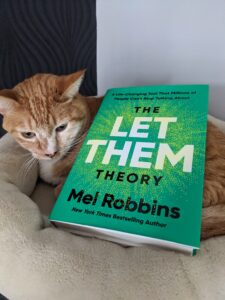The Let Them Theory by Mel Robbins
Written by Ashley Kelmore, Posted in Reviews
Best for:
No one. Seriously. The concept – the very very basic, simple, concept, is something I think many people could find helpful. But the other 299 pages of this 300 page book don’t make up for it.
In a nutshell:
Professional self-help writer Mel Robbins claims to have discovered a concept that her daughter is responsible for specifically (and that various philosophical and religious groups have been pitching for centuries) and then spends a lot of time providing some okay and some awful examples of how to incorporate it into life.
Worth quoting:
“Adults are allowed to think whatever they want to think. So are you.”
Why I chose it:
I find it challenging to let people do their own thing when I (nearly always mistakenly) think it is affecting me. Or, I let it stress me when it doesn’t need to. I saw this book mentioned on TikTok and thought I’d check it out. Oh how I wish I’d done more research.
Review:
I haven’t felt such a negative visceral reaction since I read Cinderella’s Lost Diary as part of Cannonball Read 5 (my review seems to have been lost to the ages, which is probably for the best, as I think the author found it and was less than pleased). This is the type of book that I assume the great pod cast “If Books Could Kill” might take a crack at. It’s something Oprah recommends. And it’s written by someone who I now know has made her living as a sort of motivational speaker, and has previously written another pop psychology / vaguely therapy-speak book (the 5-4-3-2-1 theory, which I gather is just … count to five and then do things?) that was apparently wildly popular.
Look, I didn’t know, okay?
I should have stopped after the introduction, which Robbins calls “My Story,” and which is all about how she was in debt and unemployed and managed to claw her way out. By page three she’s basically discounting the entire concept of community support. By the end she’s talking about all the companies that have invited her to speak to them – very few of which are ones I’d be keen to brag about.
This book is full of phrases like ‘I was willing to do what most people won’t’ and ‘is supported by scientific research’ and ‘proven method’ yet contains not a single footnote. There is a bibliography, but it’s not connected to any of the claims she makes throughout the book. I probably wrote and underlined ‘citation needed’ dozens of times throughout, because even if what she was saying was supported by evidence, I couldn’t know because she refused to do the basic courtesy of provided proper citations. Ugh.
What absolutely defies belief is that the author didn’t even come up with the concept at a basic level – her daughter did. Robbins tells the story about being controlling during the lead up to her son’s prom, and her daughter tell her to just let them be. Repeatedly. And this is some epiphany for Robbins, which, fine, I get that, but then multiple times during the rest of the book she talks about how she discovered the Let Them theory. What? No she didn’t. I mean, aside from the fact that it’s a concept that’s been around forever, she literally told us that it was her daughter who told her about it. Come on.
A frustrating thing about this book for me is that the very basic underlying concept is sound in some circumstances, and something I definitely needed to be reminded of. When people are doing things interpersonally that I cannot control, I really need to just let them. I can have conversations about the behaviors that I’m finding frustrating, but I need to not let it be the thing that stresses me out or frustrates me to the extent that it is beyond my control. But the book is so bad that I had to keep reminding myself that there were some nuggets of usefulness in there.
The theory does sort of suck when it comes to actions other people take that negatively impact the world. Like, I’m not just cool with ‘letting them’ take away all the rights and protections for people who are not white, or male, or straight, or cis, for example (the ‘them’ in this instance being the US republican party). But I think the author would say that is where the ‘let me’ part of things comes in. Let them try to do shitty things, let me fight back. I guess? I don’t know. I think the theory really does fall apart outside of pretty straightforward interpersonal interactions, but even then it’s not great because she says things like ‘maybe you’ve let comments from your family ruin an entire holiday together’ – like, what comments? Are you thinking one should just ignore it when someone is racist or sexist or homophobic?
The author also seems very interested in the concept of ‘personal responsibility,’ which for me is just another way to say pull ones’ self up by one’s bootstraps. It ignores the reality in which we live, and pretends that just by not taking it personally when people are shitty, and focusing on one’s self, people can overcome anything, including hundreds of thousands of dollars of debt.
At this point in the review I’ve only gotten about 1/6 of the way through the book, and I’ve just turned the page to where she has an epigraph. You know, that quote from someone wiser than one’s self that authors will sometimes put in books? Robbins quotes … herself for her epigraphs. I mean, bold but also I’m already reading her words in the rest of the book, could she not maybe quote someone else if she was going to have epigraphs?
As a writer, Robbins is not good. The book uses some outdated ableist language throughout, and also is often a collection of words that don’t really say anything. I know, that’s a lot of what the self-help genre is, but good grief. It is bad here. She also has a warped sense of reality, as she repeatedly uses leaving a job as an example of something anyone can do. Like, what? People can definitely be trapped in jobs because they, you know, need the money to live. What world is she living in? I’m so confused. She also actually typed out the words ‘winning the game of life,’ which is a completed out of pocket idea. It’s not a game, and one can’t ‘win’ it. The hell?
She also uses the theory to sort of … excuse away manipulative behavior that others have employed on her? She talks about Frame of Reference (not sure why it’s capitalized), which I think it sort of like trying to understand other perspectives, which I’m all for, but then her conclusions are often ‘oh, they just care about you and you should understand their perspective,’ instead of recognizing that some perspectives are harmful.
The chapter on friendship and making new friends wasn’t the worst, though it seemed a bit shoehorned into the book – like trying to get this one neat trick to be applicable to all of life’s challenges. It isn’t.
But the absolute grossest chapters are the ones where Robbins tries to teach us how to manipulate the people we care about, and uses a gross example where Robbins equates weight with health and just repeatedly sympathizes with a wife who wants her husband to lose weight. It’s just awful overall, but what I found strangest was that in this example, her suggestion might work, but it doesn’t really work in other instances. Her idea is basically model the behavior you want to see. If you work out a bunch, and show you’re happy, then your husband will want to be happy like you too. Yay! Except, I mean, no. And also, what if the thing you hope will change is not something you can model? Like, if I’m worried a person needs to, say, quit their job because it is unhealthy, if I’m not in an unhealthy job, I can’t quit mine to show them how good it can be. And presumably they already see I’m working a healthy job and that hasn’t ‘motivated’ them to quit their job. I don’t know, it feels really gross and manipulative and creepy.
She also has this ABC loop that for all I can tell is just meant to help you have difficult conversations by purposefully making the other person feel bad. Like, she literally says the point is to ‘create discomfort that they feel internally.’ That is manipulative, that’s mean, and that seems actively dangerous. She also equates money with power, and recommends using money to control people. I’m sure she’d disagree, but her chapter called ‘how to provide support the right way’ really reads as putting conditions on love and support, and that’s so, so gross.
I mostly skimmed the chapters on how to find love because they seemed pretty boilerplate (I think one could get the same from the movie ‘He’s Just Not That Into You,), but I was struggling to finish this book because I really wanted to review it and also to be done with it, so it’s possible I missed some other really not good advice in there, too.
This is probably the longest review I’ve written in while, so if you stuck with me, thank you!
Now Let Me never read anything by this author again.



